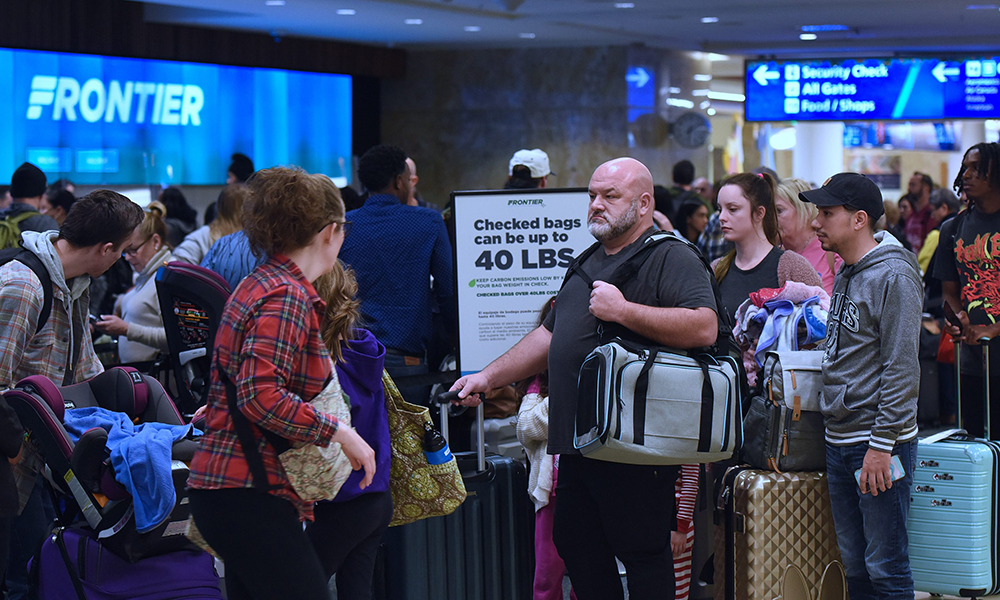
边疆航空公司(Frontier Airlines),以其低廉的票价和包括携带背包与购买机上饮料在内的多样化附加服务而闻名,正在争夺富裕旅客。该公司周二宣布,将在其飞机上增设头等舱座位,这也是低成本航空公司提供高端航班选项的大趋势的一部分。
为了配备全新的头等舱座位,边疆航空公司计划移除当前机队前排三乘三布局的经济舱座位,并在飞机前部区域改装为二乘二布局的宽敞座椅。该公司预计将于2025年底开始提供这类新座椅。
除了引入新座位布局,边疆航空公司还将重新调整其忠诚度计划,允许乘客使用里程来抵扣行李费用或享受座位升级服务。此外,该公司还计划为黄金级及以上会员提供座位免费升级服务,同时为白金级和钻石级会员免费提供同行票。
边疆航空首席执行官巴里·比弗(Barry Biffle)在一份新闻稿中表示:“我们听取了客户的意见,他们期望能有更多的高端选择,比如头等舱座位、可兑换的座位升级服务、为同行者提供的免费旅行机会,以及使用里程兑换机票以外服务的能力。”
今年早些时候,该航空公司宣布对其定价体系进行重大调整,然后推出了四种不同的预订选项——从最便宜的基本机票到更昂贵的商务机票——并取消了其中三项选择的退改签费用。
其他廉价航空公司也实施了类似的变革,旨在吸引那些愿意为旅行体验买单的“报复性消费”旅客。例如,精神航空公司(Spirit Airlines)为在欧洲境内旅行的乘客提供了无中间座位的选项,而西南航空公司(Southwest Airlines)则增加了座位的腿部空间,并摒弃了其混乱的“自选座位”模式。
西南航空公司首席执行官罗伯特·乔丹(Robert Jordan)上个月告诉美联社:疫情爆发后,“人们显然更倾向于选择高端的飞行体验。高端是自我界定的——无论是额外的腿部空间,还是飞往欧洲的头等舱——但无论具体形式如何,人们对高端服务的需求在上升"。
比弗预计,边疆航空最新的高端化策略将在2026年带来2.5亿美元收入,并且到2028年这一数字有望超过5亿美元。
廉价座位上的风景
廉价航空公司之所以试图吸引更富裕的旅客,归根结底是为了摆脱亏损的财务困境。尽管2024年美国航空业的客运量创下历史新高,但低成本航空公司的收益并不可观。以美国客运量排名第七的精神航空公司为例,该公司于11月根据美国破产法典第十一章申请破产保护,原因是燃油价格和劳动力成本上涨,侵蚀了整个行业的利润率。虽然这可能意味着边疆航空公司少了一个竞争对手,但边疆航空自身的业绩也不理想,10月的收入为9.35亿美元,净利润仅为2600万美元。
更重要的是,达美航空(Delta)和美国航空(American Airlines)等传统大型航空公司一直在蚕食低成本航空公司的市场,原因是它们能够为富裕旅客提供更多增值服务:例如,达美航空将从本月开始为头等舱乘客提供Shake Shack汉堡。为了利用最后一分钟才决定出行的旅客和寻求报复性消费的旅客,航空公司还增加了飞往热门旅游目的地的航班,但运力增加意味着有更多的空座位需要填补,因此航空公司降低票价以吸引乘客填补这些座位。
廉价航空公司效仿这一策略,将优质设施和折扣票价相结合,最终往往意味着顾客要支付更高的票价(从长远来看),这可能会削弱廉价航空公司“低成本”的声誉。对于无法承受更多损失的廉价航空公司来说,这是值得冒的风险。
达美航空首席执行官埃德·巴斯蒂安(Ed Bastian)在7月的财报电话会议上说:"如果你处于航空业食物链的底层,就无法承受持续亏损,尤其是考虑到过去几年我们所见证的需求状况。”(财富中文网)
译者:中慧言-王芳
边疆航空公司(Frontier Airlines),以其低廉的票价和包括携带背包与购买机上饮料在内的多样化附加服务而闻名,正在争夺富裕旅客。该公司周二宣布,将在其飞机上增设头等舱座位,这也是低成本航空公司提供高端航班选项的大趋势的一部分。
为了配备全新的头等舱座位,边疆航空公司计划移除当前机队前排三乘三布局的经济舱座位,并在飞机前部区域改装为二乘二布局的宽敞座椅。该公司预计将于2025年底开始提供这类新座椅。
除了引入新座位布局,边疆航空公司还将重新调整其忠诚度计划,允许乘客使用里程来抵扣行李费用或享受座位升级服务。此外,该公司还计划为黄金级及以上会员提供座位免费升级服务,同时为白金级和钻石级会员免费提供同行票。
边疆航空首席执行官巴里·比弗(Barry Biffle)在一份新闻稿中表示:“我们听取了客户的意见,他们期望能有更多的高端选择,比如头等舱座位、可兑换的座位升级服务、为同行者提供的免费旅行机会,以及使用里程兑换机票以外服务的能力。”
今年早些时候,该航空公司宣布对其定价体系进行重大调整,然后推出了四种不同的预订选项——从最便宜的基本机票到更昂贵的商务机票——并取消了其中三项选择的退改签费用。
其他廉价航空公司也实施了类似的变革,旨在吸引那些愿意为旅行体验买单的“报复性消费”旅客。例如,精神航空公司(Spirit Airlines)为在欧洲境内旅行的乘客提供了无中间座位的选项,而西南航空公司(Southwest Airlines)则增加了座位的腿部空间,并摒弃了其混乱的“自选座位”模式。
西南航空公司首席执行官罗伯特·乔丹(Robert Jordan)上个月告诉美联社:疫情爆发后,“人们显然更倾向于选择高端的飞行体验。高端是自我界定的——无论是额外的腿部空间,还是飞往欧洲的头等舱——但无论具体形式如何,人们对高端服务的需求在上升"。
比弗预计,边疆航空最新的高端化策略将在2026年带来2.5亿美元收入,并且到2028年这一数字有望超过5亿美元。
廉价座位上的风景
廉价航空公司之所以试图吸引更富裕的旅客,归根结底是为了摆脱亏损的财务困境。尽管2024年美国航空业的客运量创下历史新高,但低成本航空公司的收益并不可观。以美国客运量排名第七的精神航空公司为例,该公司于11月根据美国破产法典第十一章申请破产保护,原因是燃油价格和劳动力成本上涨,侵蚀了整个行业的利润率。虽然这可能意味着边疆航空公司少了一个竞争对手,但边疆航空自身的业绩也不理想,10月的收入为9.35亿美元,净利润仅为2600万美元。
更重要的是,达美航空(Delta)和美国航空(American Airlines)等传统大型航空公司一直在蚕食低成本航空公司的市场,原因是它们能够为富裕旅客提供更多增值服务:例如,达美航空将从本月开始为头等舱乘客提供Shake Shack汉堡。为了利用最后一分钟才决定出行的旅客和寻求报复性消费的旅客,航空公司还增加了飞往热门旅游目的地的航班,但运力增加意味着有更多的空座位需要填补,因此航空公司降低票价以吸引乘客填补这些座位。
廉价航空公司效仿这一策略,将优质设施和折扣票价相结合,最终往往意味着顾客要支付更高的票价(从长远来看),这可能会削弱廉价航空公司“低成本”的声誉。对于无法承受更多损失的廉价航空公司来说,这是值得冒的风险。
达美航空首席执行官埃德·巴斯蒂安(Ed Bastian)在7月的财报电话会议上说:"如果你处于航空业食物链的底层,就无法承受持续亏损,尤其是考虑到过去几年我们所见证的需求状况。”(财富中文网)
译者:中慧言-王芳
Frontier Airlines, known for its cheap fares and fees for everything from bringing a backpack to buying an in-flight drink, is making a bid for wealthy travelers’ wallets. The discount airline will introduce first-class seating on its planes, the company announced Tuesday, part of a greater trend of low-cost carriers premiumizing flight options.
In order to install the new first-class seats, Frontier will scrap the first two rows of three-by-three economy seats in its current fleet and retrofit the larger chairs in two-by-two rows at the front of the aircrafts. The airline will begin offering the seats in late 2025.
Along with new seating, Frontier will rework its loyalty program so customers will be able to trade in miles for waived baggage fees and seating upgrades. It will also dole out free seat upgrades to gold-tier members and above, and free companion tickets to platinum- and diamond-level members.
“We’ve listened to customers, and they want more—more premium options, like first class seating, attainable seat upgrades, more free travel for their companions, and the ability to use miles on more than just airfare,” Frontier CEO Barry Biffle said in a press release.
The changes come on the heels of an overhaul of its pricing structure announced earlier this year, in which the airline introduced four different booking options—from the cheapest basic to more expensive business—and ditched change and cancellation fees for three of those options.
Other discount airlines have made similar changes to appeal to revenge-spending passengers willing to shell out on travel, such as Spirit Airlines blocking out the middle seat for customers travelling within Europe, and Southwest Airlines expanding leg room and doing away with its chaotic choose-your-own-seat model.
After the pandemic, “there is a clear preference for more premium,” Southwest CEO Robert Jordan told the Associated Press last month. “Premium is kind of self-defined—whether that is extra legroom, first-class to Europe, whatever it is—but there is a rise in the desire for premium, something a little better.”
Biffle expects Frontier’s latest premiumization to bring in $250 million revenue in 2026 and more than $500 million in 2028.
The view from the cheap seats
Low-cost carriers’ appeal to wealthier travelers is ultimately a bid to rescue themselves from a financial model that has hemorrhaged money. Despite U.S. airlines seeing record travel in 2024, discount carriers haven’t seen strong returns. Spirit Airlines, the U.S.’s seventh-largest airline by passenger amount, filed for Chapter 11 bankruptcy in November due to hiked-up fuel prices and labor costs that dissolved profit margins across the sector. While that may mean one less competitor for Frontier, it hasn’t fared much better, reporting in its October earnings $935 million in revenue but only $26 million in net income.
What’s more, large legacy carriers like Delta and American Airlines have been eating the lunch of their low-cost counterparts, as they already have the ability to both dole out plushier perks to those who can afford it: Delta will offer Shake Shake to its first-class flyers starting this month, for example. But to take advantage of last-minute travelers and revenge spenders, airlines also expanded routes to tourist hotspots, and the greater capacity meant more empty seats to be filled and lower airfare to entice travelers to fill those seats.
Discount airlines copying this strategy, combining better amenities and discount prices, often ultimately means higher fares for customers in the long run, which could weaken low-cost carriers’ reputations for being, well, low-cost. It’s a calculated risk for budget airlines that cannot afford to lose more money.
“You cannot, if you are on the lower end of the industry’s food chain, continue to post losses,” Delta CEO Ed Bastian said in an earnings call in July, “particularly given the health of the demand set we’ve seen over these last couple of years.”






